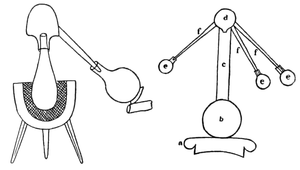| THE HISTORY OF ALCOHOL. |
By Prof. CHARLES ERNEST PELLEW.
II.
IT is a curious fact that, although intoxicating beverages have been known and used from time immemorial, alcohol itself was not discovered until after the fall of the Roman Empire, and, when once discovered, it was not used for intoxicating purposes for many hundred years. Pliny, in his Natural History, written about a. d. 50, mentions that oil of turpentine could be extracted from the crude pitch by boiling the latter in open vessels and catching the vapors on fleeces, from which the condensed oil could be pressed. This marks the first beginnings of the art of distillation, which progressed but slowly, for, two hundred years later, we read that sailors were accustomed to get potable water from sea water by similar crude methods.
About this time there existed a flourishing school of alchemists at Alexandria, and it is probable that some of them had, or soon would have, developed the art further. But a. d. 287 the Emperor Diocletian destroyed their books and prohibited their studies, for fear lest by discovering the philosopher's stone, and  Old Stills used by Alexandrians hence learning to change base metals into gold, they might overturn the Roman rule. A more serious disaster befell the later Alexandrian School of Philosophy in the destruction of the famous Alexandrian Library by the Mohammedan general Amru, a. d. 984, at the orders of the Caliph Abu Bekr. "If the books agree with the Koran, they are not needed; if opposed, they are injurious." This was the argument which helped to put back civilization some centuries, and gave Literature, as well as science and medicine, a blow from which she has not yet recovered. It is curious to speculate what would be our present condition if only two or three of our recent advances—the discovery of galvanic electricity, for instance, or the germ theory of disease—had been made but one hundred years earlier.
Old Stills used by Alexandrians hence learning to change base metals into gold, they might overturn the Roman rule. A more serious disaster befell the later Alexandrian School of Philosophy in the destruction of the famous Alexandrian Library by the Mohammedan general Amru, a. d. 984, at the orders of the Caliph Abu Bekr. "If the books agree with the Koran, they are not needed; if opposed, they are injurious." This was the argument which helped to put back civilization some centuries, and gave Literature, as well as science and medicine, a blow from which she has not yet recovered. It is curious to speculate what would be our present condition if only two or three of our recent advances—the discovery of galvanic electricity, for instance, or the germ theory of disease—had been made but one hundred years earlier.
As it was, the study of science had to be begun over again almost from the very foundation by the Arabians under a more enlightened rule. The famous Geber about the close of the eighth century mentions the term distillation, but it is doubtful whether

